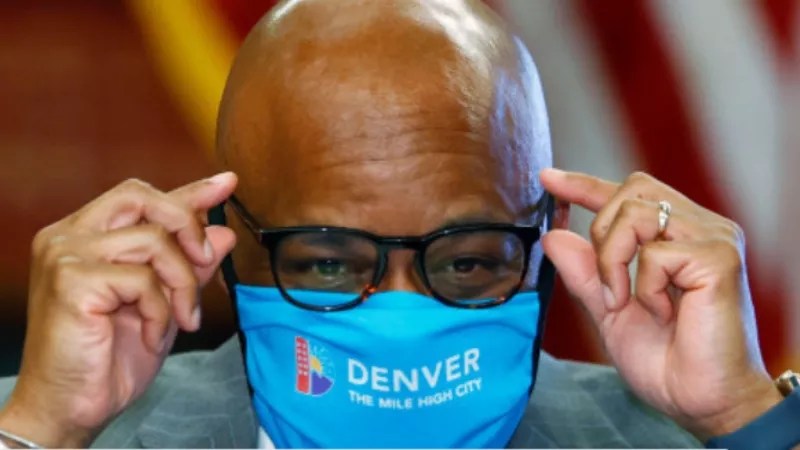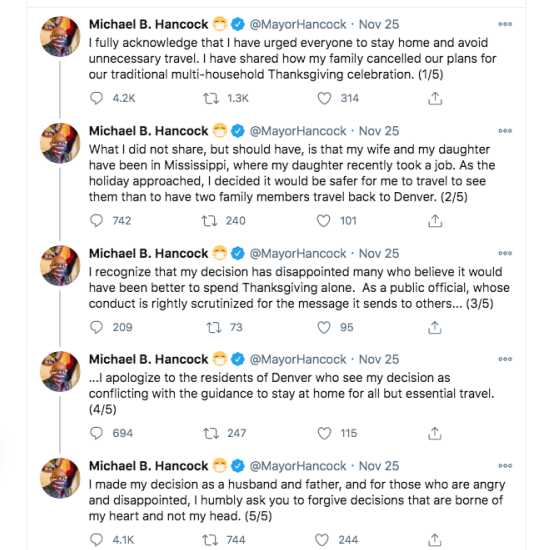

Audio By Carbonatix
When Governor Gavin Newsom of California was recently photographed maskless at a crowded restaurant, he probably thought he’d just made the dumbest political decision of the year. Enter Mayor Michael Hancock, saying: ‘Hold my beer.’
National media outlets ranging from the Wall Street Journal to CNN have all covered the piquant irony of a major city’s leader tweeting out “avoid travel” while standing in line to board a plane out of Denver on Thanksgiving eve. Such a galumphing, public misstep was going to demand a masterful apology – a Hail Mary of mea culpas.
Alas, it was not to be.
And so, partly for the mayor’s benefit, here’s a short guide to effective public apologies:
Get to the point.
Rule 101 in these situations is to address the issue immediately and focus directly on the apology itself. Instead of that, Mayor Hancock sent out a sprawling series of tweets – 177 words in total – that meandered around the topic without ever quite addressing it, fuelling the outrage of citizens. His response – over-long, self-serving and slightly passive-aggressive – ticked pretty much every box on the “Don’t do that” list. It was a master class in getting an apology wrong.
Don’t try to justify your actions.
The second basic rule of a public apology – and the one that politicians struggle with most – is to simply accept the damage is done and just, well, say sorry. Time and again, influential figures fool themselves into thinking that ‘I’m sorry, but…’ might be an acceptable option. Which is why, after verbally abusing Alexandria Ocasio-Cortez in July, Republican Ted Yoho chose to mansplain some guff about “misconstrued” words, then add, “I cannot apologize for my passion.” (Way to bury that story, Congressman!) And last week, surely the only person in Denver not to realize that referencing “decisions borne of my heart and not my head” would send thousands into an apocalyptic rage was Mayor Hancock himself.

Remember who you’re apologizing to.
This sounds like a no-brainer but, with so much focus on damage limitation and preserving the apologist’s image, the whole point of the exercise can simply get lost. Following accusations of a bullying culture on her talk-show earlier this year, Ellen DeGeneres flubbed her much-anticipated apology by making her speech largely about herself and throwing in a bevy of awkward jokes. Not only was it tonally weird, it also felt like the wronged workers had been left out of the whole process.
Be honest and straightforward.
Surprisingly often, people making public apologies throw fresh tinder onto their own fire by trying to get smart, and end up patronizing as well as offending their audience. Case in point: Mayor Hancock’s tweets helpfully explained that he’d hopped on a plane because “it would be safer for me to travel to see them than to have two family members travel back to Denver.” Which is true. But gee, if only there was a third option. Something like, I dunno, staying home and hosting a virtual gathering, as he’d repeatedly urged the rest of the city to do.
Never stoop to the non-pology.
The dreaded non-pology (‘I’m sorry if you felt that way’) is the scourge of the apology world. Earlier this year, former Glee star Lea Michelle perfectly demonstrated the form when she kind-of-but-not-really said sorry for how former colleagues had “perceived” her past behavior. And last week, the mayor was absolutely chugging from the same Kool-Aid. Read closely, and you’ll see that his tweets offer regrets to those “who see my decision as conflicting with the guidance” and “who believe it would have been better [for me] to spend Thanksgiving alone.” Rather than admit any actual wrongdoing, he merely acknowledges that some snowflakes might see it that way. Not so much eating humble pie as flinging it back at his accusers.
Demonstrate how you will improve.
Effective public apologies recognize that people not only want to know you’re sorry, they also want to see that you’ve learned. Ann Hathaway neatly exemplified this approach while apologizing recently for negative body portrayals in her latest movie, by explicitly stating, “Now that I know better, I promise I’ll do better.” If you carefully parse Hancock’s tweets, however, you’ll see there’s no “Eureka!” moment of self-discovery in there. If anything, they end with a weird humblebrag about him being such a dedicated husband and father. Er…Yay, mayor?
Finally: Just take it on the chin and apologize!
Whenever politicians or celebrities get themselves in a sorry mess (pun intended), it’s because they tried to qualify their contrition or claw something back. But here’s the thing: If someone simply says, “Hey, I screwed up big time, and I’m sorry, and I’m going to learn from it and try to be better,” most people will give them the time of day. And this seems especially pertinent to Hancock’s situation, because he had literally no case to argue. His clearest road to redemption was obviously to come clean and ask for forgiveness.
I’m just sorry that he couldn’t see that.